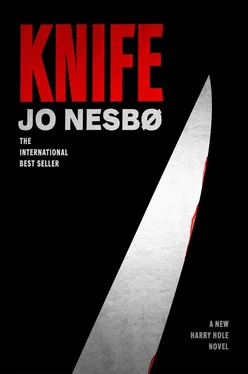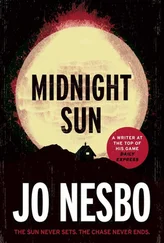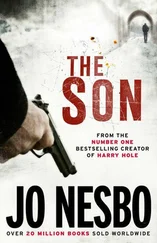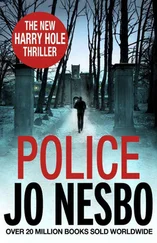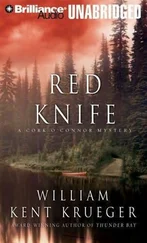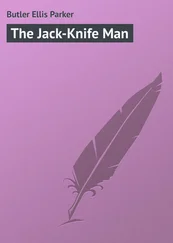Katrine felt sorry for her, but this wasn’t the time for kid gloves.
“In that case you’ve done a terrible job, because your client’s dead,” she said. “And you’re not a defense lawyer, you’re a young woman with a law degree and a boss you’re fucking because you think it’ll help you climb the ladder. It won’t. And it won’t help you to try and play tough with me, OK?”
Alise Krogh Reinertsen stared at Katrine. Blinked. A first tear began to make its way through the powder on the young woman’s cheek.
Six minutes later, Katrine had all the details. She had asked Alise to close her eyes, relive the first shot, and say “now” when the bullet hit, and “now” when she heard the rumble. There was over a second between them, so the shot had come from at least four hundred metres away. Katrine thought about the points of impact. The man’s genitals, then one of his eyes. That wasn’t an accident. The killer had to be either a competitive marksman or have specialist military training. There couldn’t be many people like that who had served time at the same time as Svein Finne. Probably none, at a guess.
And a suspicion, almost a hope — no, not even that, just a vain wish — ran through her. Then disappeared. But that glimpse of an alternative truth left something warm and soothing behind it, like the faith religious people cling to even though their intellect rejects it. And for a few moments Katrine couldn’t feel the northerly wind as she looked at the park in front of her and imagined it in the summer, the island with the willow tree, the flowers, insects buzzing, birds singing. All the things she would soon be able to show Gert. Then another thought struck her.
The stories she was going to tell Gert about his father.
The older he got, the more he would want to know about that part of him, the man he had come from.
Something that would make him either proud or ashamed.
It was true that the badger in her had woken up. And that a badger, in theory, could dig right through the planet in the course of its lifetime. But how deeply did she want to dig? Maybe she’d found out all she wanted to know.
She heard a sound. No, it wasn’t a sound. Silence.
The watch on the other side of the lake. It had stopped bleeping.
A dog’s sense of smell is, roughly speaking, a hundred thousand times more sensitive than a human’s. And, according to recent research that Sung-min had read, dogs can do more than just smell. A dog’s Jacobson’s organ, located in its palate, also allows it to detect and interpret scentless pheromones and other information without any smell. This means that a dog — in perfect conditions — can follow the trail left by a human being up to a month later.
The conditions weren’t perfect.
The worst of it was that the trail they were following ran along a sidewalk, which meant that other people and animals had confused the scent. And there wasn’t much vegetation for scent particles to cling to.
On the other hand, both Sørkedalsveien and the sidewalk — which ran through a residential area — weren’t as heavily trafficked as the city centre. And it was cold, which helped preserve scent. But, more important, even if there were large clouds blowing in from the northwest, it hadn’t rained since Svein Finne had been there.
Sung-min felt tense each time they approached a bus stop, sure that the trail was about to end, that that was where Finne had got off a bus. But Kasparov just kept going, straining at his leash — he seemed to have forgotten all about his aching hips — and on the slopes heading up towards Røa, Sung-min began to regret not changing out of his suit into jogging gear.
But as he sweated he was getting more and more excited. They had been going for almost half an hour, and it seemed unlikely that Finne would have used public transport at all, only to walk such an unnecessarily long way after he got off.
Harry stared out across Porsanger Fjord, towards the sea, towards the North Pole, towards the end and the beginning, towards where there was probably a horizon on clearer days. But today, the sea, sky and land all blurred together. It was like sitting under a huge, grey-white dome, and it was as quiet as a church, the only sounds the occasional plaintive cry of a gull and the sea lapping gently against the rowing boat the man and boy were sitting in. And Oleg’s voice:
“...and when I got home and told Mum that I put my hand up in class and said that Old Tjikko isn’t the oldest tree in the world, but the oldest roots, she laughed so much I thought she was going to start crying. And then she said that the three of us had roots like that. I didn’t tell her, but I thought that couldn’t be right, because you’re not my father the way the roots are Old Tjikko’s father and mother. But as the years passed, I realised what she meant. That roots are something that grow. That when we used to sit there talking about... I don’t know, what did we talk about? Tetris. Skating. Bands we both like...”
“Mm. And both...”
“...hate.” Oleg grinned. “That’s when we grew roots. That was how you became my father.”
“Mm. A bad father.”
“Rubbish.”
“You think I was an average father?”
“An unusual father. Lousy grades in some subjects, world’s best in others. You saved me when you came back from Hong Kong. But it’s funny, I remember the little things best. Like the time you tricked me.”
“I tricked you?”
“When I finally managed to beat your Tetris record, you boasted that you knew all the countries in the world atlas in the bookcase. And you knew exactly what was going to happen after that.”
“Well...”
“It took me a couple of months, but by the time my classmates looked at me weirdly when I mentioned Djibouti, I knew the names, flags and capital cities of every country in the world.”
“Almost all.”
“All.”
“Nope. You thought San Salvador was the country and El Salvador—”
“Don’t even try.”
Harry smiled. And realised that was exactly what it was. A smile. Like the first glimpse of sun after months of darkness. Even if a new period of darkness lay ahead of him, now that he had finally woken up, but it couldn’t be worse than the one that lay behind him.
“She liked that,” Harry said. “Listening to us talk.”
“Did she?” Oleg looked off to the north.
“She used to bring the book she was reading, or her knitting, and sit down near us. She didn’t bother to interrupt or join in the conversation, she didn’t even bother to listen to what we were talking about. She said she just liked the sound. She said it was the sound of the men in her life.”
“I liked that sound too,” Oleg said, pulling the fishing rod towards him so that the tip bowed respectfully towards the surface of the water. “You and Mum. After I’d gone to bed I used to open the door just so I could listen to you. You used to talk quietly, and it sounded like you’d already said pretty much everything, understood each other. That all that needed adding was the occasional key word here or there. Even so, you used to make her laugh. It was such a safe sound, the best sound to fall asleep to.”
Harry chuckled. Coughed. Thought that sound carried a long way in this weather, possibly all the way to land. He tugged dutifully at his own fishing rod.
“Helga says she’s never seen two grown-ups as in love with each other as you and Mum. That she hopes we can be like you.”
“Mm. Maybe she ought to hope for more than that.”
“More than what?”
Harry shrugged. “Here comes a line I’ve heard too many men say. Your mother deserved better than me.”
Oleg smiled briefly. “Mum knew what she was getting, and it was you she wanted. She just needed that break to remember that. For the pair of you to remember Old Tjikko’s roots.”
Читать дальше
